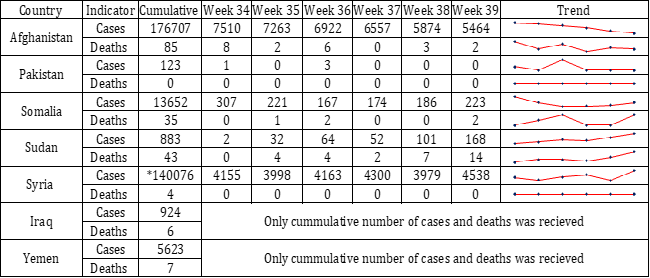As of 30 September 2023, globally, a total of 29 countries reported AWD/cholera outbreaks. In the Eastern Mediterranean Region of WHO, 9 countries namely, Afghanistan, Iraq, the Islamic Republic of Iran, Lebanon, Pakistan, Somalia, Sudan, Syria, and Yemen have reported acute watery diarrhoea (AWD)/ suspected cholera cases during 2022. In 2023, 8 out of these 9 countries continued to report AWD/ suspected cholera cases in 2023, however, cholera outbreak in Lebanon was officially announced as closed on 5th June 2023.
During the reporting period (epi week 38-39 2023), a total of 2,1101 new AWD/suspected cholera cases – including 30 associated deaths- were reported from 4 Member States (table 1). During the period of 1 January to 30 September 2023, cumulatively, a total of 337,988 AWD/suspected cholera cases-including 180 associated deaths- were reported from 7 Member States (table 1).
Table 1: Number of cases, deaths and trend of AWD/suspected cholera cases reported from 7 member states in the EMR, January-September 2023
*Syria cholera data was updated retrospectively.
While males and females seem to be equally affected by AWD/ suspected cholera in the Region, most of the AWD/ suspected cholera cases in Afghanistan (57%), both Somalia and Syria (54%) are children under five years of age. In Lebanon and Yemen, children under five years represent 26% and 24% of the total suspected cases respectively. There are many drivers contributing to the resurgence of cholera in the Region, such as climate change, conflict and political instability, weak health systems, increased population movement, poor water and sanitation infrastructure, and low awareness among the public. With the support of WHO and other partners, all cholera-affected countries implemented multisectoral cholera response interventions, including coordination, water and sanitation, early warning surveillance, laboratory diagnosis, clinical management, risk communication and community engagement, and oral cholera vaccination.
Considering that many countries in the Region are facing natural disasters, political and economic instability, and armed conflicts, it’s critical to enhance the prevention, preparedness, and response capacities for AWD/cholera in the region. Therefore, the high-risk countries -with WHO support- need to work on strengthening coordination, building capacities for early detection, diagnosis, and rapid response to AWD/cholera outbreaks, in addition to enhancing the capacity for risk communication and community engagement.
Subscribe to the monthly infectious hazard preparedness newsletter of WHO’s Health Emergencies Programme for the latest data and analysis on epidemic- and pandemic-prone diseases, as well as news on outbreak preparedness and response within WHO’s Eastern Mediterranean Region.




